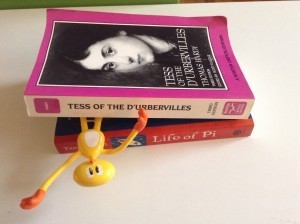G.G. Andrew's Blog, page 12
May 27, 2015
Writers Who Read: Lynn Kanter
The Writers Who Read series continues this week with Lynn Kanter.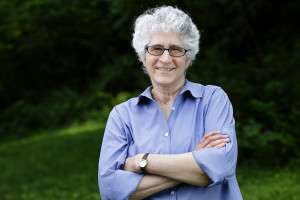
Who are you?
I’m the author of Her Own Vietnam, a novel about a woman who served as a U.S. Army nurse in Vietnam, and 30 years later must grapple with her history on the eve of the war in Iraq. The book was published in November 2014 by a new feminist press called Shade Mountain Press. I’ve also written two previous novels, The Mayor of Heaven and On Lill Street. I’m a lifelong activist, and I work for a national social justice organization. Oh, and I’m a newlywed – if you don’t count the 21 years my wife and I were together before we got married.
What are three beloved books you first read before the age of 12?
Mary Poppins by P. L Travers – which is much darker than the Disney movie.
Mary Changes Her Clothes, a book written and illustrated by a family friend, Ellie Simmons. I was six years old when I met the author. She signed her book for me and added personal illustrations, such as a dog that says, “Hello, Lynn!” It made a big impression on me. I still have the book.
Miss Bobbie by Ethel Turner. I believe the book was published in 1908. This novel was my grandmother’s favorite book when she was a child, and I loved it too. The book was about a little girl who’s being raised by her father after her mother died. He must travel abroad, and leaves her for some weeks with another family that has five boys. Miss Bobbie learns to live like a boy – climbing trees, playing fiercely, making her own decisions. Then her father returns with a new wife, and Bobbie realizes her days of freedom are over. It was the first feminist novel I ever read.
What is one book you are always recommending to friends and family (and maybe the local barista) as an adult?
It varies day by day. Right now it’s the novel Silver Sparrow by Tayari Jones. I write a blog and a newsletter that are (mostly) about books by women, so I have many ways to share my bookish enthusiasms in addition to cornering people at parties.
What is your book kryptonite–those unique elements in a book, beyond just great writing and three-dimensional characters, that make you unable to resist reading?
I love books that tell a great story and have women protagonists who live in a wider world than just their own relationships and problems. If a book can take me behind the scenes of an event or a life – historical or fictional – or reveal it to me from a new perspective, even better.
What is your ideal time and place to read?
Weekend afternoons. In warm weather, on the back porch. In cold weather, in front of the fireplace. Also, in bed at the end of a long day.
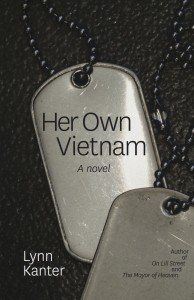 Which books have had the biggest influence on your writing?
Which books have had the biggest influence on your writing?
I’m not sure there are specific books, but there are some writers whose work has influenced me, such as Barbara Kingsolver and Carol Anshaw. Both of them write good, sturdy prose about characters who face challenges in their own lives and are also aware and connected to the broader world and the issues of the day.
How do you balance reading and writing in your life?
Reading is an everyday activity, while writing for me is cyclical. There are periods when I’m writing intensely and have only a few minutes a day to read, and other periods when I’m not writing much at all.
Choose your preferred book form: ebook, physical book, or audio book?
I read all three. Physical books are my favorite; like many readers, I love the feel of a book, its heft, the promising whisper of the turned page. I also listen to a lot of audiobooks, because they turn non-reading time (commuting, housework) into reading time. Ebooks are great for traveling. I always have a pathological fear of running out of reading material while away from home.
Do you consciously plan your future reading–i.e., set book goals, keep a TBR list, participate in book challenges or book clubs? Why or why not?
I love this question. I’ve been in a book group for about 20 years. We read books by or about women – mostly novels, but some nonfiction as well. Our current book is Penelope Fitzgerald: A Life by Hermione Lee. We have a somewhat chaotic system for choosing our future books, but usually manage to plan out several months in advance. I also keep a haphazard TBR list, but it’s just to remind myself of books that sound good. I would need to quit my job and give up on sleeping in order to read them all.
What are you reading now?
I’ve got three books going: Into the Go-Slow by Bridgett M. Davis, To the River by Olivia Laing, and The Rainy Season: Three Lives in the New South Africa by Maggie Messitt.
You can find out more about Lynn on her blog or Twitter, as well as sign up for her free literary newsletter here.
 Tags: activism, Barbara Kingsolver, book club, Bridgett M. Davis, Carol Anshaw, Ellie Simmons, Ethel Turner, feminism, feminist press, Hermione Lee, Into the Go-Slow, Lynn Kanter, Maggie Messitt, Mary Changes Her Clothes, Mary Poppins, Miss Bobbie, Olivia Laing, P.L. Travers, Penelope Fitzgerald: A Life, Shade Mountian Press, Silver Sparrow, Tavari Jones, The Rainy Season: Three Lives in the New South Africa, To the River, U.S. Army, Vietnam, women protagonists, Writers Who Read
Tags: activism, Barbara Kingsolver, book club, Bridgett M. Davis, Carol Anshaw, Ellie Simmons, Ethel Turner, feminism, feminist press, Hermione Lee, Into the Go-Slow, Lynn Kanter, Maggie Messitt, Mary Changes Her Clothes, Mary Poppins, Miss Bobbie, Olivia Laing, P.L. Travers, Penelope Fitzgerald: A Life, Shade Mountian Press, Silver Sparrow, Tavari Jones, The Rainy Season: Three Lives in the New South Africa, To the River, U.S. Army, Vietnam, women protagonists, Writers Who ReadDel.icio.us


TweetThis

Digg

StumbleUpon

Comments: 1 (One) on this itemYou might be interested in this:
 Writers Who Read: Rita Arens
Writers Who Read: Rita Arens Writing by Rom-Com: Matters of Life and Dating
Writing by Rom-Com: Matters of Life and Dating Exploring an Undiscovered Country
Exploring an Undiscovered Country Writers Who Read: Gill Hoffs
Writers Who Read: Gill Hoffs Daniel Hales: Top Ten Prose Poetry BooksCopyright © G. G. Andrew [Writers Who Read: Lynn Kanter], All Right Reserved. 2015.
Daniel Hales: Top Ten Prose Poetry BooksCopyright © G. G. Andrew [Writers Who Read: Lynn Kanter], All Right Reserved. 2015.How To Choose What to Write Next
I wouldn’t have guessed it five years ago, but there is such a thing as having too many ideas. 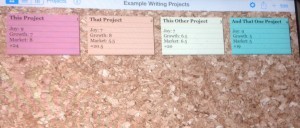 Writing ideas, at least. It seems to happen to me on a weekly basis now: a fabulous idea for a new novel, begging to be written. This year I’ve felt like I’ve had twenty-two story ideas, seven half-started drafts, and…very little to show in the way of completed books.
Writing ideas, at least. It seems to happen to me on a weekly basis now: a fabulous idea for a new novel, begging to be written. This year I’ve felt like I’ve had twenty-two story ideas, seven half-started drafts, and…very little to show in the way of completed books.
Because I’ve discovered I can’t write all of these stories–not all at once, at least. I’ve got to choose which one to focus on at any given time. Maybe you’re the same. Maybe while you’re penning your historical seamonster trilogy, the idea for an erotic Frankenstein fanfic calls your name. And then a horror short story, and a long blog post on chastity belts.
Which project do you work on first?
I’ve created a solution that helps me prioritize projects this year: organizing my many ideas by scoring them on three dimensions: joy/excitement, growth potential, and estimated market value.
How do you try this? First, write down all your current project ideas. You can do this on a simple sheet of paper, or, better yet, index cards for each project. I use the Index Card app on my iPad Mini, which is fabulous because I can move project cards around and color-code them (the best solutions always involve color coding). Whatever format you choose, just don’t add up the scores on these projects until you’ve rated every idea on these three dimensions.
The first dimension: joy. Look at each project and decide, on a scale of one to ten, how excited you are to write it. Zero means you have absolutely no interest, five means you’d be okay writing it; and ten means you wouldn’t want to do anything else (including swimming in a non-calorie chocolate sea with hot naked lifeguards on watch). Be honest, and right now don’t consider how marketable the idea is, how much your sister loves it, or the amount of work it might take. Think simply about how much joy it would bring you. Gauge your feelings right at this monent– you can change them down the line.
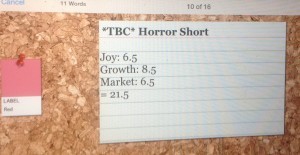 Next, think about how much that project could lead you to grow as a writer. Will this novel expand your skills and experience in ways other stories haven’t? I give higher scores to projects in different genres or different formats. If you’ve only written standalone books, starting a series will grow you as a writer. So will writing a 7,000-word short story if you’ve only written novels. I usually give at least a seven to novels, since I always find them challenging, but your mileage may vary. It’s less important what your rating criteria is than being consistent throughout your scoring. And, yes, half-points are okay.
Next, think about how much that project could lead you to grow as a writer. Will this novel expand your skills and experience in ways other stories haven’t? I give higher scores to projects in different genres or different formats. If you’ve only written standalone books, starting a series will grow you as a writer. So will writing a 7,000-word short story if you’ve only written novels. I usually give at least a seven to novels, since I always find them challenging, but your mileage may vary. It’s less important what your rating criteria is than being consistent throughout your scoring. And, yes, half-points are okay.
After this comes the trickiest question: how marketable is this project? Read widely in your genre, talk to other authors, and observe the marketplace to the best of your ability. Are you writing a unique type of story that you’re guessing readers will crave? Or is it another addition to an oversaturated subgenre? Possibly you’re writing in a popular genre, but those books are still selling like hot cakes. Use your best judgment here.
Finally, add up the three numbers under each project to give them an overall score. Then, arrange or color-code your projects with a highlighter to see which ideas have the highest scores. The ideas that come out on top are projects that are your best bets to work on next: overall, they provide the best combination of joy, growth, and marketability of your current ideas. You’re going to get the best juice for your squeeze here.
The results of this scoring may surprise you, as it often does me. Sometimes a project doesn’t seem very marketable to me, but it has so much joy and growth potential, I know it’s something I’d be wise to work on soon. Other times a project has great growth and marketability, and, combined with a decent excitement level, presents as a solid project.
As I alluded to above, these scores change over time. It’s worth revisiting your projects list every few months to consider if the excitement or market worth of a project has shifted, for better or worse.
Which criteria do you use to prioritize writing projects?
 Tags: erotic Frankenstein fanfic, Index Card app, organization, reading, seamonsters, what do I write next?, writing, writing priorities, writing projects
Tags: erotic Frankenstein fanfic, Index Card app, organization, reading, seamonsters, what do I write next?, writing, writing priorities, writing projectsDel.icio.us


TweetThis

Digg

StumbleUpon

Comments: 1 (One) on this itemYou might be interested in this:
 Are You Surprised by the Books that Stay with You?
Are You Surprised by the Books that Stay with You? Best Winter Romances on Netflix Instant
Best Winter Romances on Netflix Instant 2015 Book Non-resolutions
2015 Book Non-resolutions Guest Post: Why I Write Romance for Women Over 40
Guest Post: Why I Write Romance for Women Over 40 Why is Bigfoot Scary (and Funny)?Copyright © G. G. Andrew [How To Choose What to Write Next], All Right Reserved. 2015.
Why is Bigfoot Scary (and Funny)?Copyright © G. G. Andrew [How To Choose What to Write Next], All Right Reserved. 2015.May 21, 2015
Writers Who Read: Maggie Messitt
The Writers Who Read series continues this week with Maggie Messitt.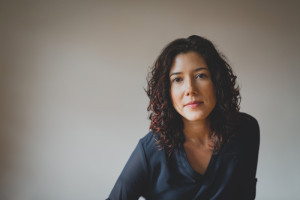
Who are you?
Hi—I’m Maggie Messitt, author of The Rainy Season: Three Lives in the New South Africa. I lived in rural northeastern South Africa for eight years during which time I was an editor, journalist, and the founding director of a writing school for African women. The Rainy Season—a work of literary journalism—introduces readers to the remote bushveld community of Rooiboklaagte and opens a window into the beautifully complicated reality of daily life in South Africa. It tells the stories of three generations in the Rainbow Nation one decade after its first democratic elections. This multi-threaded narrative follows a tapestry weaver in her sixties, standing at the crossroads where her Catholic faith and the AIDS pandemic crash; a middle-aged sangoma (traditional healer) taking steps to turn her shebeen into a fully licensed tavern; and a young man taking his matriculation exams, coming of age as one of Mandela’s Children, the first academic class educated entirely under democratic governance.
What are three beloved books you first read before the age of 12?
I had an unusual relationship with books growing up – a love/hate relationship. My mother had six children and I was the last. Reading for her was a necessary escape. And, as my siblings went to school or left the house, she read more and more. Apparently, I didn’t like this because I was known to throw her books in the trash or hide them around the house. I never loved to read, but I loved being read to and I loved it when my mother and I would read to one another, alternating chapters. As early as third grade, I started reading the newspaper to my parents in the morning at the breakfast table. The books to which I connected (or have the strongest memory around) before this love-hate relationship turned more toward love included an old raggedy biography from the school library on Wilma Rudolph, the Encyclopedia Brown series, and the Adventures of Huckleberry Finn.
What is one book you are always recommending to friends and family (and maybe the local barista) as an adult?
The House on Mango Street, by Sandra Cisneros, is absolutely the most gifted book on my bookshelf. And, I’ve also taught it in classrooms, ranging from junior high and university to prison workshops and alternative adult learners.
What is your book kryptonite–those unique elements in a book, beyond just great writing and three-dimensional characters, that make you unable to resist reading?
My kryptonite falls inside books like Behind the Beautiful Forevers, by Katherine Boo, and The Spirit Catches You and You Fall Down, by Anne Fadiman. I disappear inside true stories of cultures or communities other than my own.
What is your ideal time and place to read?
At home, I alternate between being a before-bed-only reader and an all-day on the porch reader. Give me a thunderstorm, a flashlight, a hot cup of tea, an old afghan and a good book and life is pretty much perfect. When I’m on vacation, I like reading in public spaces where I can toggle between people watching and stepping inside another world.
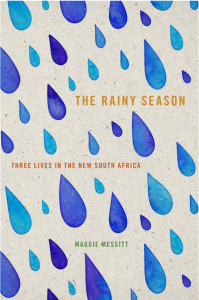 Which books have had the biggest influence on your writing?
Which books have had the biggest influence on your writing?
I find myself taking away small bits of influence from each writer I read, but the most influential writers in my life have been Maya Angelou, Sandra Cisneros, Thomas French, Jonathan Kozol, Alex Kotlowitz, and Paul Salopek.
How do you balance reading and writing in your life?
I will admit, I’m not very good at this. When I’m in the throws of a book – writing a book, that is – my reading tends to be limited to this subject. I jump down a lot of rabbit holes which is exciting and worthy of my reading time, both leisure and professional. But, when I’m in between projects, I hide inside books that have been accumulating beside my bed and on my staircase. Anyone who walks into my house sees stacks of books in too many places: some stacks for book research, other stacks to explore potential articles or essays, stacks of books inside of which I plan to vacation, and stacks of books for my comprehensive exams. The latter collection, formed three years ago when I started my PhD, are consumed like a marathon, slow and steady, one by one. I’ll make my way through them. Eventually. These include literary journalism and South African literature.
Choose your preferred book form: ebook, physical book, or audio book?
I have deep love for audio books, bringing me back to my childhood and long road trips with my mom, but I am also partial to paper (and have a love for all things paper). I can’t get as excited with an e-book, but I’m trying.
Do you consciously plan your future reading–i.e., set book goals, keep a TBR list, participate in book challenges or book clubs? Why or why not?
I have never been in a book club and I don’t participate in book challenges – mostly b/c I have enough peer pressure in my life. But, I do keep a reading journal and, in some ways, my PhD comps feels like one giant book challenge.
What are you reading now?
Begging to be Black by South African poet and activist Antjie Krog.
An independent narrative and immersion journalist, Maggie Messitt has spent the last decade reporting from inside underserved communities in southern Africa and middle America. Typically focused on complex issues through the lens of every day life, her work is deeply invested in rural regions, social justice, and environmental sustainability. Author of The Rainy Season , Messitt lived in northeastern South Africa for 8 years during which time she was a long-form reporter, newspaper editor, and founding director of a writing school. Since returning to the US, her essays and reportage have been published in Creative Nonfiction, Essay Daily, Memoir Journal, Mother Jones, Narratively (forthcoming), River Teeth , and the Southern Poverty Law Center’s Teaching Tolerance magazine, among others. A PhD candidate at Ohio University and a 2015 Scholar-in-Residence at Bowers Writers House, Messitt is currently hard at work on her next book, a hybrid of memoir and investigation, the story of her aunt, an artist, missing since 2009.
You can find out more about Maggie on her website, Facebook page, or Twitter.
 Tags: Adventures of Huckleberry Finn, Alex Kotlowitz, Antjie Krog, audio books, Begging to be Black, Behind the Beautiful Flowers, Encyclopedia Brown series, Jonathan Kozol, Maggie Messitt, Paul Salopek, Sandra Cisneros, South Africa, The House on Mango Street, The Rainy Season, The Spirit Catches You and You Fall Down, Thomas French, Wilma Rudolph, Writers Who Read
Tags: Adventures of Huckleberry Finn, Alex Kotlowitz, Antjie Krog, audio books, Begging to be Black, Behind the Beautiful Flowers, Encyclopedia Brown series, Jonathan Kozol, Maggie Messitt, Paul Salopek, Sandra Cisneros, South Africa, The House on Mango Street, The Rainy Season, The Spirit Catches You and You Fall Down, Thomas French, Wilma Rudolph, Writers Who ReadDel.icio.us


TweetThis

Digg

StumbleUpon

Comments: 0 (Zero), Be the first to leave a reply!You might be interested in this:
 Writers Who Read: Rita Arens
Writers Who Read: Rita Arens Reading: To Plan or Not to Plan?
Reading: To Plan or Not to Plan?  Writers Who Read: Clea Simon
Writers Who Read: Clea Simon Writers Who Read: Stephanie Feldman
Writers Who Read: Stephanie Feldman What's Your Book Diet?Copyright © G. G. Andrew [Writers Who Read: Maggie Messitt], All Right Reserved. 2015.
What's Your Book Diet?Copyright © G. G. Andrew [Writers Who Read: Maggie Messitt], All Right Reserved. 2015.May 12, 2015
Writers Who Read: Jenny Sadre-Orafai
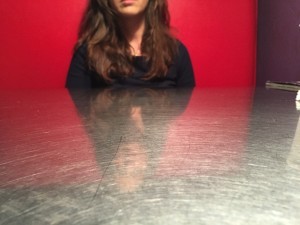 The Writers Who Read series continues this week with poet Jenny Sadre-Orafai.
The Writers Who Read series continues this week with poet Jenny Sadre-Orafai.
Who are you?
Jenny Sadre-Orafai, author of four chapbooks and the poetry collection Paper, Cotton, Leather (Press 53). I also write creative non-fiction (The Rumpus, The Toast, South Loop Review, Los Angeles Review) and serve as co-founding editor of Josephine Quarterly.
What are three beloved books you first read before the age of 12?
My memory is terrible. So, according to my mom, my three books were: E.B. White’s Charlotte’s Web, Laura Ingalls Wilder’s Little House on the Prairie books, and my mom’s old Nancy Drew books (Carolyn Keene).
What is one book you are always recommending to friends and family (and maybe the local barista) as an adult?
Jenny Offill’s Dept. of Speculation
What is your book kryptonite–those unique elements in a book, beyond just great writing and three-dimensional characters, that make you unable to resist reading?
Poetic language, vivid imagery, and first person narrators (like in Donna Tartt’s The Little Friend and Jeffrey Eugenides’ Middlesex). I also love writing that’s intense and compact (like Sarah Manguso’s The Guardians and Ongoingness).
What is your ideal time and place to read?
In bed and in the afternoon, but I’ll read whenever and wherever I get the chance.
Which books have had the biggest influence on your writing?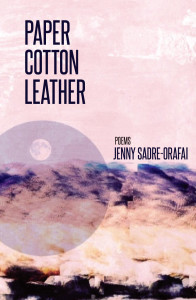
Anne Sexton’s The Complete Poems, Olena Kalytiak Davis’ And Her Soul Out of Nothing, Gwendolyn Brooks’ Selected Poems, and Sarah Manguso’s The Guardians.
How do you balance reading and writing in your life?
I certainly read more than I write, which seems to work for me. I make time for both because they’re important to who I am. Reading is my way of escaping everything, of getting outside of my head. There’s nothing I’d rather spend time doing—except writing.
Choose your preferred book form: ebook, physical book, or audio book?
Always the physical book. I need that weight.
Do you consciously plan your future reading–i.e., set book goals, keep a TBR list, participate in book challenges or book clubs? Why or why not?
No. I don’t keep track of the books I’ve read or will read. I just don’t think of books in that way. The only person I’ve ever read with is my mom, the most voracious reader I know. We’ll pick a book and read it together a couple of times a year. We get pretty competitive about who finishes the book first, but we have really terrific conversations later. I never would have become such an avid reader if it weren’t for her. There was nothing she encouraged more than reading. She would—and still does—buy me any book I wanted. I am grateful for that because it’s what led me to writing.
What are you reading now?
Julia Elliott’s The Wilds, and it is so amazing.
Jenny Sadre-Orafai is the author of Paper, Cotton, Leather and four chapbooks. Recent poetry has appeared or is forthcoming in Tammy, Linebreak, Redivider, Eleven Eleven, Thrush Poetry Journal, PANK, Rhino, Sixth Finch, ILK, iO: A Journal of New American Poetry, and Poemeleon. Recent prose has appeared in The Rumpus, The Toast, and Los Angeles Review. She is co-founding editor of Josephine Quarterly and an Associate Professor of English at Kennesaw State University.
You can find out more about Jenny on Twitter (@86753ohnine), or her website.
 Tags: Anne Sexton, books, Carolyn Keene, chapbooks, Charlotte's Web, creative non-fiction, Donna Tartt, Gwendolyn Brooks, Jeffrey Eugenides, Jenny Sadre-Orafai, Josephine Quarterly, Julia Elliott, Laura Ingalls Wilder, Middlesex, Nancy Drew, Olena Kalytiak Davis, poetry, reading, Sarah Manguso, The Little Friend, The Wilds, Writers Who Read, writing
Tags: Anne Sexton, books, Carolyn Keene, chapbooks, Charlotte's Web, creative non-fiction, Donna Tartt, Gwendolyn Brooks, Jeffrey Eugenides, Jenny Sadre-Orafai, Josephine Quarterly, Julia Elliott, Laura Ingalls Wilder, Middlesex, Nancy Drew, Olena Kalytiak Davis, poetry, reading, Sarah Manguso, The Little Friend, The Wilds, Writers Who Read, writingDel.icio.us


TweetThis

Digg

StumbleUpon

Comments: 0 (Zero), Be the first to leave a reply!You might be interested in this:
 Writers Who Read: Kristin Fields
Writers Who Read: Kristin Fields Reductress Articles
Reductress Articles On Writing What People Fear
On Writing What People Fear Introducing the Writers Who Read Series
Introducing the Writers Who Read Series Writers Who Read: Amy ThomasCopyright © G. G. Andrew [Writers Who Read: Jenny Sadre-Orafai], All Right Reserved. 2015.
Writers Who Read: Amy ThomasCopyright © G. G. Andrew [Writers Who Read: Jenny Sadre-Orafai], All Right Reserved. 2015.April 27, 2015
Thoughts on Horror & Story While Watching THE BABADOOK
I just watched THE BABADOOK, this Australian horror movie streaming on Netflix about a
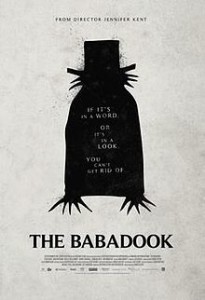
Photo courtesy of Wikipedia.
creature that comes alive from the pages of a children’s book–one you’d never borrow from your library because it’s a creepy vintage popup book and also it’s fucking evil. It made me think a lot about stories and what makes them scary. Here are my thoughts.
1. Especially in the horror genre, creating atmosphere is so important. A romantic comedy can have some dramatic moments, a science fiction some comedic ones… but the atmosphere in a horror movie or novel should create a sense of the creepy throughout, even where there are no monsters. The family in THE BABADOOK has a tragic, bloody backstory, and their home is full of dim halls and shadowy corners.
2. Part of this atmosphere often includes a silence that permeates scenes. This makes those unnatural sights and startling noises that eventually come all the more unsettling.
3. When we hear noises out of nowhere, or see images grotesque and frightening, we’re scared because it’s unexpected. This element of shock also makes humor and romance work: the punchline we didn’t see coming, the kiss after a fight. And especially in horror, that shock makes our adrenaline run.
4. The best shocks are the ones that are the most unnatural and strange. In THE BABADOOK, this is the monster repeating the weird “Ba-ba-dook!” as his calling card. Our brain is further unnerved as we try to suss out its meaning.
5. Even with the strange and unnatural, we must recognize something human in a horror story. The mother in THE BABADOOK is someone I recognized: as the mother of a boy with social and emotional challenges, her simultaneous expression of exhaustion, love, frustration, and fear felt very real to me as a special needs parent. We must recognize and care about characters to care what happens to them.
5. Along with the shocks, there is often also a slow build in stories as we feel characters (and sometimes ourselves) descending into a sort of madness. It looks like a man in a tophat is at the foot of our stairs, but maybe it’s just clothing hanging from the coat rack. The horror outside reflects what’s happening inside ourselves.
6. In this way, the best horror movies are always about other things, internal things. It’s not monsters or ghosts but something else that it’s all about, that we really fear or need to work through. This is true in THE BABADOOK, where the mother must face her internal demons as she fights the creature who’s entered her home.
7. Maybe all horror stories are about other things. Demented clowns and dolls are scary because they represent the perversion of innocence. Zombies frighten us with the reminder of our own ugly mortality, Frankenstein with our monstrous and fallible ability to create. Fright is internal, after all, the monsters only emphasizing the fear within.
 Tags: book, fear, Frankenstein, Ghosts, horror, Monsters, romantic comedy, science fiction, special needs, THE BABADOOK, zombies
Tags: book, fear, Frankenstein, Ghosts, horror, Monsters, romantic comedy, science fiction, special needs, THE BABADOOK, zombiesDel.icio.us


TweetThis

Digg

StumbleUpon

Comments: 0 (Zero), Be the first to leave a reply!You might be interested in this:
 Reading: To Plan or Not to Plan?
Reading: To Plan or Not to Plan?  Writers Who Read: Clea Simon
Writers Who Read: Clea Simon Top Ten Reasons Romance Writers Should Pen Horror
Top Ten Reasons Romance Writers Should Pen Horror Writers Who Read: Jenny Vinyl
Writers Who Read: Jenny Vinyl What Good Books DoCopyright © G. G. Andrew [Thoughts on Horror & Story While Watching THE BABADOOK], All Right Reserved. 2015.
What Good Books DoCopyright © G. G. Andrew [Thoughts on Horror & Story While Watching THE BABADOOK], All Right Reserved. 2015.Writers Who Read: Lisa Barr
The Writers Who Read series continues this week with author Lisa Barr.
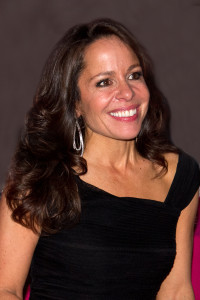 Who are you?
Who are you?
Hi — I’m Lisa Barr, author of the award-winning debut novel FUGITIVE COLORS, a suspenseful tale of stolen art, love, lust, deception, and revenge on the ‘eve’ of WWII. I’m also the editor and creator of the popular parenting blog, GIRLilla Warfare, and a working journalist for the past 20 years. I always say I’ve covered everything from “terrorism to cleavage.” I’m also happily married, a mom of THREE teenage daughters (talk about REAL drama) and two dogs. I’m addicted to coffee (my home motto: ‘Give me the coffee and no one gets hurt’). I also treasure my time with my besties, biking, and love (as in, must-have) a great Cabernet.
What are three beloved books you first read before the age of 12?
The Giving Tree by Shel Silverstein, Are You There God? It’s Me, Margaret by Judy Blume (and pretty much EVERYTHING else by Judy Blume), and Fear of Flying by Erica Jong (I read it at 10 years old; snuck it from my parents’ bookshelf).
What is one book you are always recommending to friends and family (and maybe the local barista) as an adult?
There are so many books I love, but I always recommend keeping your own journal (that’s NOT on your phone), that you actually have to write down your thoughts and feelings inside a beautiful hard-covered blank-paged book. I have kept a diary since I was nine … and the first line is “I love David” (a young boy from my fourth grade class … ahhhh those curls, those dimples). How ironic that I married a man named David years later (another story, a better story). Your journal is who you are, and truly it is THE book that will always be remembered and treasured.
What is your book kryptonite–those unique elements in a book, beyond just great writing and three-dimensional characters, that make you unable to resist reading?
I love relationship-y books, romance with suspense; a delicious love story no matter the time period gets me every time. I need a happy ending, but I love it when a novel takes twists and turns to get there …
What is your ideal time and place to read?
My ideal time to read is of course while traveling, but in my reality, it is the one hour BEFORE I pick up my kids from school — just before my Me-Time is over and Mommy-Time kicks in. I also love hearing my husband snore next to me while I read into the wee hours of night. When my world — kids, hubby, dogs — are sleeping, it is truly precious, stolen time.
Which books have had the biggest influence on your writing? 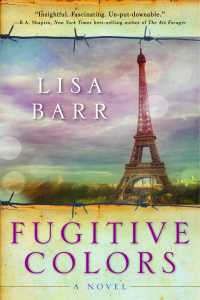
All Judy Blume (she raised me), Ken Follett (art of suspense), D.H. Lawrence (forbidden love), William Shakespeare (everything else — love, tension, conflict, character development, the music-in-words).
How do you balance reading and writing in your life?
If you are attempting to balance motherhood, wifehood, writer life, and reading — forget it. There is no such thing as balance (a made-up concept), so I don’t even try. I take My Time wherever and whenever I can get it to read and write.
Choose your preferred book form: ebook, physical book, or audio book?
I’m Old School — I love to hold a real book, feel pages, and underline a beautiful word or phrase, and I like looking at the author photo and think about his/her life and how it impacted the novel.
Do you consciously plan your future reading–i.e., set book goals, keep a TBR list, participate in book challenges or book clubs? Why or why not?
Definitely. I make lists all the time (I’m a Yellow Sticky Note Junkie) — and I pick and choose my future reading lists, depending on what I need at that moment — lighter fare, or the deep, dark and dirty. As for book clubs etc., I’m a member of one. But I join others when they are reading my book. I pop in if they are local, and I SKYPE with book clubs from coast-to-coast. I’ve been on an extensive book tour all year, so I have to be in a state of consciousness and planning on everything. I also am part of a fabulously talented network of authors, called the Tall Poppy Writers Group. So their books are on the top of my reading list. For me, the TPs are literally group therapy on a daily basis — it truly helps all of us pump one anothers’ works, navigate The Biz, and set book goals. But as one who juggles Mom/Wife/Writer/And Everything Else — I give myself a break when my lists don’t pan out. Writing and reading are breathing for me — aside from my family, it is what makes me the happiest. So yes, I plan away, and I delve in, whenever and wherever I can.
What are you reading now?
I just read Every Fifteen Minutes by Lisa Scottoline on a 12-hour plane ride over to Israel. And about to start my friend and fab writer Anita Hughes’ French Coast …
You can find out more about Lisa on her book site, Twitter (@lisabarr18), or Facebook, and you can email her at lisafrydman@aol.com.
 Tags: Anita Hughes, Are You There, biking, Cabarnet, D.H. Lawrence, daughters, Erica Jong, Every Fifteen Minutes, Fear of Flying, French Coast, Fugitive Colors, God? It's Me, journal, Judy Blume, Ken Follett, life balance, Lisa Barr, love story, Margaret, Shel Silverstein, Skype, sticky note, teenagers, The Giving Tree, William Shakespeare, Writers Who Read
Tags: Anita Hughes, Are You There, biking, Cabarnet, D.H. Lawrence, daughters, Erica Jong, Every Fifteen Minutes, Fear of Flying, French Coast, Fugitive Colors, God? It's Me, journal, Judy Blume, Ken Follett, life balance, Lisa Barr, love story, Margaret, Shel Silverstein, Skype, sticky note, teenagers, The Giving Tree, William Shakespeare, Writers Who ReadDel.icio.us


TweetThis

Digg

StumbleUpon

Comments: 0 (Zero), Be the first to leave a reply!You might be interested in this:
 Writers Who Read: Ann Gelder
Writers Who Read: Ann Gelder Writers Who Read: Kristin Fields
Writers Who Read: Kristin Fields Jane the Virgin & Writing with Confidence
Jane the Virgin & Writing with Confidence Manscaping on Book Covers
Manscaping on Book Covers Writers Who Read: Kassandra LambCopyright © G. G. Andrew [Writers Who Read: Lisa Barr], All Right Reserved. 2015.
Writers Who Read: Kassandra LambCopyright © G. G. Andrew [Writers Who Read: Lisa Barr], All Right Reserved. 2015.April 22, 2015
Writers Who Read: Naomi Zener
The Writers Who Read series continues this week with author Naomi Zener.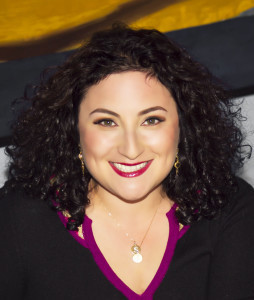
Who are you?
I’m the author of Deathbed Dimes, available in both paperback and ebook online worldwide, and I write satirical short fiction on my Satirical Mama Blog.
What are three beloved books you first read before the age of 12?
1. Charlotte’s Web
2. A Midsummer Night’s Dream
3. James and The Giant Peach
What is one book you are always recommending to friends and family (and maybe the local barista) as an adult?
Lately, I’m recommending The Enchanted by Rene Denfeld. This is a Pulitzer Prize worthy novel. See my review here. Last year, my big recommendation (and I’m still championing it) was Real Happy Family by Caeli Wolfson Widger.
What is your book kryptonite–those unique elements in a book, beyond just great writing and three-dimensional characters, that make you unable to resist reading?
Books where the writing grabs me from the first page and is replete with complex and flawed characters are ones that don’t let go of my attention. It can be historical fiction, literary fiction, chicklit, a suspenseful thriller, or a commercial satire. As long as the words jump off the page, I’m hooked. And, I can reread every book in the Shopaholic series–it’s reading candy for my brain.
What is your ideal time and place to read?
Anytime, anywhere. So long as my kids are occupied and I’m not writing or working, I will be reading.
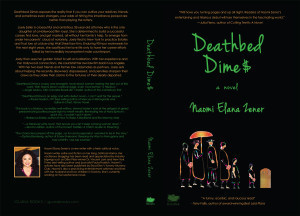 Which books have had the biggest influence on your writing?
Which books have had the biggest influence on your writing?
Comedy has had its biggest influence on my writing. The writing of Mel Brooks and Woody Allen, and the jokes of Joan Rivers, Robert Klein, George Carlin, and Jackie Mason, all had the greatest impact on the formation of my voice. I’m a satirist at heart. I read all the time for enjoyment and to hone my craft. While I don’t write literary fiction, but reading books like Crime and Punishment, A Fine Balance, The Headmaster’s Wager, The Jungle, Z, The Aviator’s Wife, etc…make me a better writer.
How do you balance reading and writing in your life?
I have a young family and legal career, so I find reading time by stealing it, whether it be on a subway ride, when running on the elliptical machine, during dinner with my husband while he watches hockey–basically whenever I can. As for writing time outside of working hours, I do so when inspiration strikes me. My husband knows I will disappear and he respects that. I’m a fast writer, so luckily I can write a lot in a short period of time.
Choose your preferred book form: ebook, physical book, or audio book?
I support all book formats, so no matter what floats a person’s boat, I’m just happy they’re reading. I must admit, I’ve never tried an audio book on for size, so I can’t comment on them. Personally, I’m physical book gal. I have bad eyes and I love the tactile quality of holding a book–physically turning its pages–so ebooks are tough for me. I do have an ereader, which will be useful if I ever go on vacation to keep the weight on my luggage down.
Do you consciously plan your future reading–i.e., set book goals, keep a TBR list, participate in book challenges or book clubs? Why or why not?
I do keep a TBR list–it currently sits at 500 books. My personal book challenge for this year is to read 100 novels. I’m not much of a non-fiction reader, but if a few slip in, I will count them towards meeting my challenge. I participate in Catherine McKenzie’s One Book One Facebook book club when I can.
What are you reading now?
The Art of Fielding by Chad Harbach
Naomi Elana Zener is the author of both Deathbed Dimes and satire fiction, which is posted on her blog Satirical Mama. Her vociferous blogging has been read and appreciated by industry bigwigs such as Giller Prize winner Dr. Vincent Lam and New York Times best-selling author and journalist Paula Froelich. Naomi blogs for Huffington Post and her articles have been published by Kveller, Absrd Comedy, and Erica Ehm’s Yummy Mummy Club. She’s currently working on her sophomore novel. You can connect with her on her website, on Goodreads, or on Twitter @satiricalmama.
 Tags: A Fine Balance, A Midsummer Night's Dream, Caeli Wolfson Widger, Chad Harbach, Charlotte's Web, comedy, Crime and Punishment, Deathbed Dimes, James and the Giant Peach, Naomi Zener, Real Happy Family, Rene Denfeld, satire, Satirical Mama, Shopaholic, The Art of Fielding, The Aviator's Wife, The Enchanted, The Headmaster's Wage, The Jungle, Z
Tags: A Fine Balance, A Midsummer Night's Dream, Caeli Wolfson Widger, Chad Harbach, Charlotte's Web, comedy, Crime and Punishment, Deathbed Dimes, James and the Giant Peach, Naomi Zener, Real Happy Family, Rene Denfeld, satire, Satirical Mama, Shopaholic, The Art of Fielding, The Aviator's Wife, The Enchanted, The Headmaster's Wage, The Jungle, ZDel.icio.us


TweetThis

Digg

StumbleUpon

Comments: 0 (Zero), Be the first to leave a reply!You might be interested in this:
 2014: My Year in Books
2014: My Year in Books Writers Who Read: Stephanie Feldman
Writers Who Read: Stephanie Feldman Jane the Virgin & Writing with Confidence
Jane the Virgin & Writing with Confidence Writers Who Read: Laura Madeline
Writers Who Read: Laura Madeline Romance Flash FictionCopyright © G. G. Andrew [Writers Who Read: Naomi Zener], All Right Reserved. 2015.
Romance Flash FictionCopyright © G. G. Andrew [Writers Who Read: Naomi Zener], All Right Reserved. 2015.April 14, 2015
Ten Types of Angst Book Nerds Get
I read a lot. I love books. But sometimes this reading life makes me crazy. Here are ten ways to tell if books have driven you batty too.
1.) The Doorstopper Dread
Your friend recommends this incredible book he’s just read. It’s beautiful, it’s one of a kind, it’s…nine hundred pages long. Everyone knows that sometimes you never want a good book to end, but nobody mentions the darker side: how many books you could’ve read while you were finishing your supernovel.
2.) The Non-reader Conversation Void
You’ve met a new person, and she seems cool, and so you invite her out for coffee. But then, before your drinks hit the table, it comes out: she’s not a reader. You spend the rest of the meal panicking because you’re not sure how to hold a conversation without mentioning books.
3.) The Due Date Panic
You’ve waited too long to start that new Austen Project book, and your library wants it back. And you can only keep that Jeff Vandermeer ebook for six more days. You’ve got to strategize your reading for the next week like a war general, hitting a minimum pages per day at the sake of sleep.
4.) The Series Squirm
You were making a dent in your mile-long TBR pile, but then everybody started making sequels to their stories. Then came the trilogies, then the seven-book epics, and you’ve become dizzy from all the books you aren’t reading (not to mention all the cliffs you’re hanging from). When will it end?
5.) The It Book Angst
Your friend wants to know if you’ve read the latest book–you know, the one that everyone’s talking about. You haven’t, so you request it from the library–and the waiting list is a hundred people long. By the time you read it, no one will want to talk about it anymore, and in the meantime you’re missing out on timely bookish discussions.
6.) The Hardcover Blues
You want to buy the first editions of books by your favorite authors, but you’ve got to send the kids to college, too. Of course reading is worth the price of rubies, but with some books costing as much as small furniture at Ikea, your bank account isn’t the only thing that’s depressed.
7.) The Book Challenge Sweats
You signed up to read 56 horror novels on Goodreads this year, but by April you’ve only cracked one-and-a-half. You’re secretly scared that Goodreads hires people to show up at your door with a stern look and a billy club if December 31st rolls around and you haven’t met your book challenge. Or maybe they’ll send a message with an unhappy emoticons, which could be worse.
8.) The PolyBook Panic
You were rereading that classic you studied in college, but then you picked up a new science fiction novel one night. The next day, you dipped into a New Adult romance. Then things really spiraled out of control and you’re somehow in the middle of seven books all at once. Their covers stare at you accusingly, knowing full well you’ve been seeing other stories.
9.) The One-Click Overdo
If you had a dollar for every book you bought for ninety-nine cents, you wouldn’t be so poor. Every crook of your Nook is stuffed with ebooks you got on sale, and the water bill’s due next week. In the meantime, you wish BookBub would shut its mouth.
10.) The Social Bookus Interruptus
You’re really glad to have a night out with the girls. Really. Except you’re in the middle of the most fascinating memoir, and you can’t wait to read what happens next. Don’t even try to pretend like no one will notice if you’re in the bathroom for a half-hour.
What about reading makes you crazy?
 Tags: Austen Project, book challenges, books, due dates, Goodreads, hardback books, Jeff Vandermeer, library, New Adult, reading, science fiction, series
Tags: Austen Project, book challenges, books, due dates, Goodreads, hardback books, Jeff Vandermeer, library, New Adult, reading, science fiction, seriesDel.icio.us


TweetThis

Digg

StumbleUpon

Comments: 0 (Zero), Be the first to leave a reply!You might be interested in this:
 Top Ten Ways to Spot a Rom-Com Hero
Top Ten Ways to Spot a Rom-Com Hero Romance Flash Fiction
Romance Flash Fiction 10 Weird Things on Screwing Mr. Melty
10 Weird Things on Screwing Mr. Melty Top Ten Signs You're Reading Literary Fiction
Top Ten Signs You're Reading Literary Fiction Writers Who Read: Laura MadelineCopyright © G. G. Andrew [Ten Types of Angst Book Nerds Get], All Right Reserved. 2015.
Writers Who Read: Laura MadelineCopyright © G. G. Andrew [Ten Types of Angst Book Nerds Get], All Right Reserved. 2015.April 7, 2015
Writers Who Read: Clea Simon
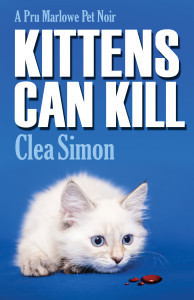 The Writers Who Read series continues this week with mystery author Clea Simon (who I think we can all agree has one of the best book titles in this series!).
The Writers Who Read series continues this week with mystery author Clea Simon (who I think we can all agree has one of the best book titles in this series!).
Who are you?
I’m a Massachusetts-based author. A former journalist, I wrote three nonfiction books before turning to a life of (fictional) crime. I now have 17 traditional mysteries (think “whodunits”) out in three series, two of which are ongoing. My most recent books are Kittens Can Kill (Poisoned Pen Press) and Stages of Grey (Severn House).
What are three beloved books you first read before the age of 12?
C.S. Lewis’s The Chronicles of Narnia, J.R.R. Tolkien’s The Lord of the Rings, and Robert Graves’s The Big Green Book. These gave me a proper respect for animals (and social equality) and also the lasting belief that there is magic in the real world.
What is one book you are always recommending to friends and family (and maybe the local barista) as an adult?
Recently, it’s been Geoff Dyer’s Jeff in Venice/Death in Varanasi, for the same reasons as the above! Though Hilary Mantel’s A Place of Greater Safety is my all-time favorite of the last decade, even more than Wolf Hall, which I also loved.
What is your book kryptonite–those unique elements in a book, beyond just great writing and three-dimensional characters, that make you unable to resist reading?
Oh, maybe British social satire of the Austen/Trolloppe sort? And Elizabethan historical fiction – thank you very much, Hilary Mantel and CJ Sansom.
What is your ideal time and place to read?
A rainy Sunday afternoon, on my sofa, with the fire going.
Which books have had the biggest influence on your writing?
I think the books of my childhood – Tolkein and Lewis and The Wind in the Willows (Kenneth Grahame).
Choose your preferred book form: ebook, physical book, or audio book?
Physical book. I read a study recently that said that when we read on screen, we tend to skim – skip words – and I felt quite validated.
Do you consciously plan your future reading–i.e., set book goals, keep a TBR list, participate in book challenges or book clubs? Why or why not?
I always have a huge TBR pile on my nightstand and another in my office, but it keeps getting interrupted by random purchases, loans from friends, and assignments to review. I read for pleasure, and occasionally (reviews) for work, so I don’t do challenges or clubs.
What are you reading now?
CJ Sansom’s Lamentations, which is good fun – but I just picked up Nina McLaughlin’s Hammer Head, a memoir of a writer who became a carpenter, so that’s jumping to next on the list. I know and admire Nina so much!
Clea Simon has a home page at http://www.CleaSimon.com but she can also be found on Facebook and Twitter @Clea_Simon. Her books can be found at Amazon, BN.com, and all the usual outlets.
 Tags: A Place of Greater Safety, animals, books, C.S. Lewis, CJ Sansom, Clea Simon, Hammer Head, Hilary Mantel, J.R.R. Tolkien, Jane Austen, Kittens Can Kill, Mysteries, mystery, Poisoned Pen Press, reading, Robert Graves, Severn House, Stages of Grey, The Big Green Book, The Wind in the Willows, Trollope, Wolf Hall, Writers Who Read
Tags: A Place of Greater Safety, animals, books, C.S. Lewis, CJ Sansom, Clea Simon, Hammer Head, Hilary Mantel, J.R.R. Tolkien, Jane Austen, Kittens Can Kill, Mysteries, mystery, Poisoned Pen Press, reading, Robert Graves, Severn House, Stages of Grey, The Big Green Book, The Wind in the Willows, Trollope, Wolf Hall, Writers Who ReadDel.icio.us


TweetThis

Digg

StumbleUpon

Comments: 0 (Zero), Be the first to leave a reply!You might be interested in this:
 Writing a Subverted Gothic Romance
Writing a Subverted Gothic Romance Writers Who Read: Nancy Slavin
Writers Who Read: Nancy Slavin Writers Who Read: Pamela DiFrancesco
Writers Who Read: Pamela DiFrancesco Writers Who Read: Kristi Belcamino
Writers Who Read: Kristi Belcamino Jane the Virgin & Writing with ConfidenceCopyright © G. G. Andrew [Writers Who Read: Clea Simon], All Right Reserved. 2015.
Jane the Virgin & Writing with ConfidenceCopyright © G. G. Andrew [Writers Who Read: Clea Simon], All Right Reserved. 2015.April 1, 2015
Writers Who Read: Aline Ohanesian
The Writers Who Read series continues this week with Aline Ohanesian.
Who are you?
Aline Ohanesian, author of Orhan’s Inheritance (Algonquin Books, April 7, 2015)
What are three beloved books you first read before the age of 12?
My parents weren’t big readers. I remember reading Nancy Drew mysteries because a family friend gave me a boxed set. Alice in Wonderland by Lewis Carroll and The Count of Monte Cristo by Alexander Dumas were both early favorites.
What is one book you are always recommending to friends and family (and maybe the local barista) as an adult?
I have a few I like to recommend. Cutting for Stone by Abraham Verghese, A Known World by Edward P Jones and Middlesex by Jeffrey Eugenides. World’s End by T.C. Boyle. Mudbound by Hillary Jordan. And Three Apples Fell From Heaven by Michelline Aharonian Marcom. I could go on and on but I’m sure the barista probably regrets asking me at this point.
What is your book kryptonite–those unique elements in a book, beyond just great writing and three-dimensional characters, that make you unable to resist reading?
I love historical fiction that is literary, written in multiple points of view.
What is your ideal time and place to read?
Every place, anytime. Reading is my oxygen. I get really blue when I’m not reading.
Which books have had the biggest influence on your writing?
That’s hard to say because I read so much. I admire certain writers more than others. I’d include the books I refer to others, listed above. Zadie Smith, Hilary Mantel, Louise Erdrich, Barbara Kingsolver. I just realized they’re all women. I read men too. I promise.
How do you balance reading and writing in your life?
I probably read three times more than I write. It’s part of the process for me. I write in the early morning and stop around noon or 1 pm. The rest of the day, there’s always a book I can read nearby.
Choose your preferred book form: ebook, physical book, or audio book?
I prefer physical books but do own an iPad and use it when I travel.
Do you consciously plan your future reading–i.e., set book goals, keep a TBR list, participate in book challenges or book clubs? Why or why not?
I don’t do any of that because reading is like breathing. It doesn’t require a whole lot of conscious planning for me. I’m always reading.
What are you reading now?
I just finished Alias Grace by Margaret Atwood. It’s historical, literary and is told from multiple points of view. It was marvelous. I’m going to read The Animals by Christian Kiefer next. I’ve heard such good things about it and we share an agent.
You can find out more about Aline or Orhan’s Inheritance on her website or Twitter.
 Tags: A Known World, Abraham Verghese, Alexander Dumas, Algonquin Books, Alice in Wonderland, Aline Ohanesian, Barbara Kingsolver, books, Christian Keifer, Cutting for Stone, Hillary Jordan, Hillary Mantel, historical fiction, Jeffrey Eugenides, Louise Erdrich, Margaret Atwood, Michelline Aharonian Marcom, Middlesex, Mudbound, Orhan's Inheritance, reading, T.C. Boyle, The Animals, The Count of Monte Cristo, Three Apples Fell From Heaven, World's End, Writers Who Read, writing, Zadie Smith
Tags: A Known World, Abraham Verghese, Alexander Dumas, Algonquin Books, Alice in Wonderland, Aline Ohanesian, Barbara Kingsolver, books, Christian Keifer, Cutting for Stone, Hillary Jordan, Hillary Mantel, historical fiction, Jeffrey Eugenides, Louise Erdrich, Margaret Atwood, Michelline Aharonian Marcom, Middlesex, Mudbound, Orhan's Inheritance, reading, T.C. Boyle, The Animals, The Count of Monte Cristo, Three Apples Fell From Heaven, World's End, Writers Who Read, writing, Zadie SmithDel.icio.us


TweetThis

Digg

StumbleUpon

Comments: 0 (Zero), Be the first to leave a reply!You might be interested in this:
 Top Ten Romance Releases in 2014
Top Ten Romance Releases in 2014 Writers Who Read: Désireé Zamorano
Writers Who Read: Désireé Zamorano Top 10 Ways to Use Twitter Without Losing Your Soul
Top 10 Ways to Use Twitter Without Losing Your Soul Writing by Rom-Com: Matters of Life and Dating
Writing by Rom-Com: Matters of Life and Dating Writers Who Read: Amy ThomasCopyright © G. G. Andrew [Writers Who Read: Aline Ohanesian], All Right Reserved. 2015.
Writers Who Read: Amy ThomasCopyright © G. G. Andrew [Writers Who Read: Aline Ohanesian], All Right Reserved. 2015.
